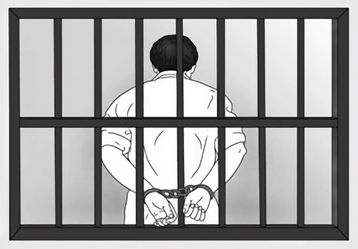(Minghui.org) Since the Chinese Communist Party (CCP) began to suppress Falun Gong in July 1999, a large number of practitioners have been detained for their belief. Some practitioners died of torture while in custody, while others passed away after they were released.
In this report, we would like to expose some of the primary methods used to torture Falun Gong practitioners at Jiayu County Detention Centre in Hubei Province at one point or another over the past 23 years. Due to censorship and internet blockade, the real situation could be much worse.
Primary Torture Methods
Typical torture methods at Jiayu County Detention Centre included:
1. violent beatings,
2. force-feeding,
3. shackled and handcuffed for lengthy durations,
4. shackling multiple practitioners together,
5. sleep deprivation,
6. forced use of drugs,
7. forced to kneel for long periods of time,
8. forced to stand against a wall for long periods of time,
9. forced relocation away from family,
10. waterboarding,
11. monetary extortion,
12. forced labor,
13. freezing torture,
14. propaganda and brainwashing.
1. Violent beating
In Jiayu County Detention Centre, violent beating was the most common method of torture. Some guards and cell heads directly beat Falun Gong practitioners or instigated other inmates to do so.
One particular type of beating was dubbed “eating steamed buns” by the guards. The victim was made to stand against the wall with a mug placed between his back and the wall. All the inmates were then required to punch or kick the victim in the chest. The victim often ended up with blood gushing out of his or her mouth.
Another particular type of beating was dubbed “stir-fried bamboo and pork.” This torture was mostly used on female practitioners. The guards would force the women to line up and kneel down in a hallway. The guards or inmates then whipped their entire bodies with thin bamboo sticks, especially the exposed skin. The pain was excruciating. Some victims rolled around screaming in pain.
A third type of beating was dubbed “eating dumplings,” with the victim wrapped up in a blanket, then punched and kicked in the chest and other parts of the body.
Mr. Zhang Yuwang, a resident of Yuyue Town in Jiayu County, died of this torture, at the age of 63. His wife described how they were both tortured in Jiayu Detention Centre in October 2002. His wife was forced to stand still against the wall the entire night, with both hands at her side.
Mr. Zhang was subjected to the torture “eating dumplings.” “The pain was unbearable, and my husband was pale,” wrote his wife, “My husband was not released until two months later. After returning home, due to the severe injuries caused by the torture, he suffered constant chest pain and had difficulty even doing household chores. His health deteriorated over time and he later died in 2010.”
Several other practitioners also died after being severely beaten at the Jiayu County Detention Centre.
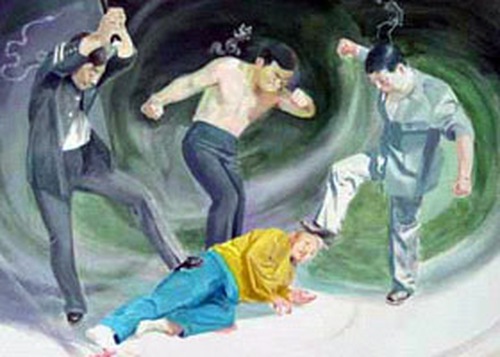
Ms. Liu Dehu, 63, was a resident of Jizhouwan Town of Jiayu County. While she was in the Jiayu County Detention Centre, she was severely beaten several times and suffered serious internal injuries. She later died in 2013.
This is her testimony:
“On January 13, 2001, I was illegally interrogated by the Political Security Section at the Jiayu County Detention Centre. Zhou Wende, a police officer, kicked, grabbed, beat, and scolded me every time he interrogated me. He pushed me down and forced me to kneel down straight while raising both hands high and straight. After I knelt like that for more than an hour, he ordered me to stand up with my feet together and arms straight and not move. This continued from morning to night. Eight people then took turns interrogating me at night.”
Liu Changlin, chief of the political security section, walked into the office at dawn asking about the interrogation. Upon hearing the officer on duty reporting that Ms. Liu refused to renounce her belief, Liu Changlin shouted, “I will kill you if you continue like this!” He then slapped Ms. Liu in the face and punched her in the right eye. After closing the door behind him, he again hit Ms. Liu in the temple and gave her a punch in her left ear. “Since then there was always humming noise in my left ear and I could not hear anything through it anymore,” Ms. Liu wrote.
Liu Changlin then knocked her to the ground with another punch, kicked her again, grabbed her hair, and asked, “Where did the (Falun Gong) materials come from?” Ms. Liu did not answer. Already in her 60s, she was forced to stand straight without moving or sleep for 28 hours. “When I was returned to the cell later, inmates said my face looked frightening with reddish and bluish bruises,” she recalled.
Another example was Mr. Shen Guoyan, in his 60s. Because of distributing Falun Gong materials, he was arrested in late September 2001. At Jiayu County Detention Centre, he was severely tortured by the guards and inmates. With his body swollen, he was extremely weak and he was on the verge of death. In October 2002, he was released home and died miserably one year later.
Mr. Xu Xiaochun, 42, was a farmer in Xinjie Town, Jiayu County. After deceiving him into going to the Xinjie Police Station one day in late 1999, an officer punched hard on both sides of his ribs, causing him to immediately pass out. Similar things happened again on April 25, 2001. Guards and inmates beat him hard and extorted 3,000 yuan from him. After Mr. Xu returned home on June 1, 2001, the injury was unable to recover. Even so, Li Bingshan, Li Yongxiang, and Li Bolin, and other officials of the Shajiashan continued harassing him at home. In the end, Mr. Xu passed away on the morning of December 13, 2006, due to internal injuries.
Ms. Zhang Yuyan was a resident of Paizhouwan Town. After going to Beijing to appeal for Falun Gong in May 2000, she was arrested and kept her at Jiayu County Detention Centre. She was brutally tortured and vomited blood as a result. She wasn’t sent to the hospital until she was dying. After she was stabilised, she was sent home but faced continued harassment from Paizhouwan 610 Office. They even took away some of her furniture. Ms. Zhang died in March 2002. She was 23.
Mr. Zhang Hu, in his 30s, was a resident from Panjiawan Town. After being arrested in 2011, he was held in Jiayu County Detention Centre for 7 days and brutally tortured. This led to severe injury of his internal organs. Later on, he also developed liver disease and diabetes. He died miserably on February 29, 2016.
2. Brutal force-feeding
Tube feeding is meant to save lives. But force-feeding has been used as a brutal torture method aimed to make Falun Gong practitioners renounce their belief. The mixture used to force-feed at Jiayu County Detention Centre was usually coarse salt with just a little water, corn paste, stimulant drugs, high-alcohol liquor, detergents, excrement, and urine.
In order to prevent practitioners from resisting the brutal force-feeding, almost all of them were tied up, hands cuffed behind their backs, chained with heavy shackles, head restrained, and held down during the force-feeding process. To inflict more pain, guards and inmates also deliberately pulled out and inserted the tube repeatedly – which often ruptured the esophagus and stomach – in an attempt to force Falun Gong practitioners to give up their practice.
Ms. Liu Dehu, mentioned above, was sent to the Jiayu County Detention Centre on January 13, 2001. The prison guards often searched the cells, and one time confiscated a copy of Zhuan Falun from her after finding it. She wrote in her personal account, “I went on a hunger strike to protest the persecution. A few days later, guards started to force-feed me. Guards and inmates, about six or seven in total, pushed me to the floor and pressed my legs and all over my body with their knees. Some pried open my mouth and some force-fed me. Some of my teeth were pried off and my lower tooth plate was damaged. It is still deformed today.”
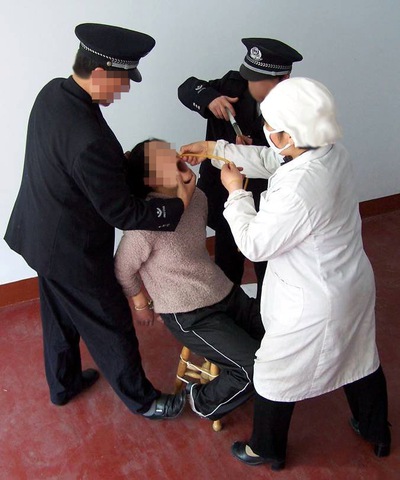
3. Forcing Practitioners to Wear Shackles and Handcuffs
Ms. Zheng Yuling was an employee of Chibi City Commercial Bureau. On the evening of November 26, 2000, she was transferred from Chibi Detention Centre to Jiayu Detention Centre. Guards put 15-kilogram (33-pound) shackles on her and handcuffed her hands behind her back onto a door to torment her. This continued for three days and three nights.
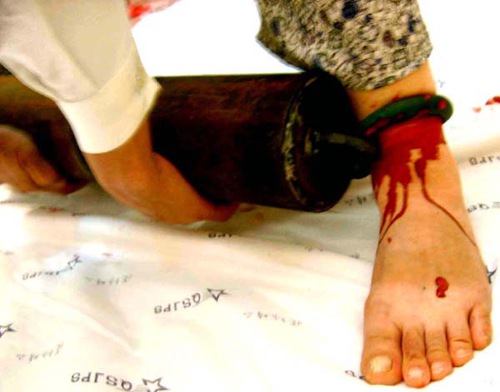
4. Handcuffing and Shackling Multiple Practitioners Together
Ms. Wang Guangyuan, 61, was an employee of the Grain Bureau of Jiayu County. One day at her workplace in January 2000, police deceived her into going to the police department, saying it was about something trivial that would only take five minutes. When Ms. Wang arrived there, a section chief surnamed Liu asked if she still practiced Falun Gong. Ms. Wang said of course, since Falun Gong and the principles of Truthfulness-Compassion-Forbearance tell one to be a better person.
“Because of these words, the police illegally detained me in the Jiayu County Detention Centre for 78 days. When I tried to do Falun Gong exercises, guards handcuffed me and chained my feet while connecting the handcuffs and shackles with three other practitioners for 18 days,” Ms. Wang recalled.
“During those days, the four of us had to eat, sleep, and go to the toilet together, even at night,” she wrote, “Because we took turns doing the exercises, the detention centre director surnamed Zhong poured water on the floor, basin after basin, making water flow everywhere…”
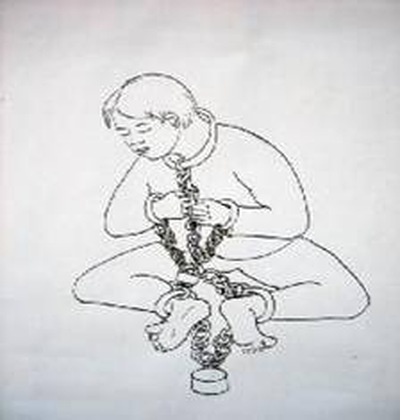
5. Sleep Deprivation
In order to receive bonuses by forcing Falun Gong practitioners to renounce their belief, officers and guards closely followed the persecution policy of the 610 Office. For example, they often deprived practitioners of sleep for a long time, together with other types of physical torture.
Ms. Liu Dehu mentioned above, for example, was held at the Jiayu County Detention Centre in December 2000 for 58 days. During those days, guards once forced her to stand still for consecutively 28 hours.
6. Forced Use of Drugs
The guards sometimes secretly administered nerve-damaging drugs to practitioners without their knowledge, turning healthy practitioners into unhealthy ones with mental disorders and severe pain.
Ms. Chen Jinxiu, in her 50s, is from Yuyue Town. While putting up Falun Gong materials on March 3, 2008, she was arrested and taken to Jiayu County Detention Centre. Director Zhong Mou and guard Wang Xia ordered her to have her photo taken, but she refused since she did not violate any laws.
Zhong and Wang then yanked Ms. Chen by her hair, while Wang kicked her hard with her high heel shoes and stomped on Ms. Chen’s feet hard. When Ms. Chen later explained to Wang what Falun Gong is and how the persecution is wrong, Wang did not listen. Instead, Wang secretly put drugs in drinks and invited Ms. Chen to drink, leaving her dizzy in a trance.
When Wang tried to take Ms. Chen to the Wuhan Brainwashing Centre, Ms. Chen resisted. Wang, along with Director Xie, Instructor Li, the driver, Sun Zongwen, and Shu Dingjiao, all beat Ms. Chen hard. Wang and Shu beat Ms. Chen the worst. Shu handcuffed Ms. Chen’s hands behind her back, stuffed dirty socks into her mouth, and sealed it with tape. While beating her, Shu screamed, “It is true I beat you, but who is there to testify against me?!”
7. Forced to Kneel for Long Periods of Time
The guards at various detention facilities across Hubei Province, including Chibi City Detention Centre, Xianning City Maoershan Detention Centre, and Jiayu County Detention Centre, often forced practitioners to kneel down as a means to abuse and humiliate them.
Ms. Liu Dehu mentioned above described her experience at Jiayu County Detention Centre in January 2001 as follows. “Zhou Wende, a police officer of the Political Security Section, kicked, grabbed, beat, and scolded me every time he interrogated me. He pushed me down, forced me to kneel down straight while raising both hands high and straight. After I knelt like that for more than an hour, he asked me to stand up with feet together and arms straight without any movement.”
8. Forced to Stand Against a Wall for Long Periods of Time
When guards or inmates forced practitioners to stand against the wall, they had to stand with both hands next to the sides of the body. They were not allowed to move, look at others, or speak. Their access to the toilet was also restricted. The inmates sometimes would also tear a piece of paper into 6 strips and place one of them between the back of the practitioner’s head and the wall, while the other five between joints and the wall. All these six strips must remain in place, and any slight movement of the paper would lead to scolding and beating.
Ms. Liu Dehu mentioned above suffered from this torture. Practitioners abused this way often suffered from backache, dizziness, swollen hands, and inability to hold things. Their legs sometimes became severely swollen, and their feet were so swollen that they could not fit back into their shoes. As the abuse continued, practitioners often staggered when walking, causing loss of balance and falls. Sometimes it led to paraplegia of the lower limbs.
9. Detaining practitioners in a different city
Sometimes practitioners from one city could be sent to an out of town detention centre, where they would be considered out-of-towners and subjected to more severe persecution, since the perpetrators were less worried about complaints from family members of the victims. In addition, the targeted practitioners were more helpless in this circumstance because it became difficult to for their local practitioners to rescue them.
For example, Zheng Yuling from Chibi City was kept in Jiayu County Detention Centre, Du Mingsheng from Chongyang County was kept in Tongcheng County Detention Centre, Wu Weihua from Wenquan City was kept in Tongshan County Detention Centre, and Xiong Qiulan from Yuxian County was kept in the Chibi City Detention Centre.
10. Waterboarding
Waterboarding was also used against practitioners during any season, including freezing winter. The victim would be stripped naked and given a bath. The guards or inmates would first apply soap all over the victim’s body. They next forced the practitioner to squat next to a wall with the back of her head against the wall. One person then poured water slowly but continuously from the top of the victim’s head. When passing the nose and mouth, the water would form a small “waterfall,” which could easily suffocate the practitioner. Anyone who struggled would be beaten up. Some practitioners were tortured this way with over 10 basins of water in the freezing winter.
11. Monetary extortion
The detention centre also used monetary extortion as a means to persecute practitioners and fatten its own pocket.
Ms. Wu Qiaoyun, 78, was retired from the Jiayu County Silk Weaving Factory. In January 2000, she was sent to the Jiayu Detention Centre, where she was held for over four months. “Whenever we did Falun Gong exercises, guards and inmates would pour buckets of cold water on our heads, even in the winter,” she recalled. She was fined 1,000 yuan before being released. In September 2000, the police ransacked her home and took her to the Jiayu Detention again. She was kept there for over one month and released only after her family was forced to pay 500 yuan.
Ms. Yang Zhenli, 49, was an employee of a grain bureau. “When we did Falun Gong exercises outside in June 2000, police arrested us and dragged our faces and feet against the ground to get us into their van, leaving us bruised,” she recalled.
Ms. Yang was fined 1,000 yuan before being released from the detention centre. Later that year (2000), she was arrested again and detained for 50 days. She was forced to pay a fine of 4,000 yuan.
12. Forced labor
The Jiayu County Detention Centre profited from detained Falun Gong practitioners by forcing them to work without pay. There were many types of forced labor, such as quarrying stones, making bricks and tiles, producing electronic products, manufacturing tin foil, farming, building roads, and other types of work.
Mr. Xu Changxin was a farmer from Xinjie Town of Jiayu County. “Liu Juhong and I went to Beijing to appeal for Falun Gong in late July 1999. We were arrested and kept at Jiayu Detention Centre for 15 days, during which time the guards ordered us to crush the stones in the mountain to make money for the detention centre,” he recalled.
“It was forced labor and I passed out due to the heat. But guards beat me up. Long Tiancheng, the head of the Xinjie Town Police Station, also illegally seized both our ID cards and has still not returned them.”
13. Freezing Torture
In the Jiayu County Detention Centre, guards poured freezing water on practitioners or on the floor of the detention cells in the cold of winter, in an attempt to force practitioners to renounce their belief.
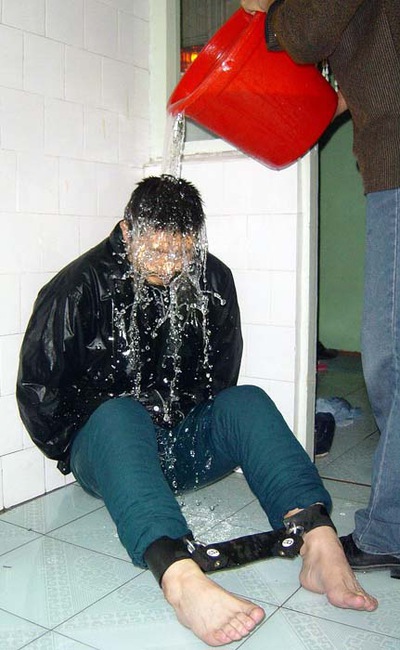
14. Propaganda and Brainwashing
Besides physical torture, guards also repeatedly broadcast hate propaganda that defamed Falun Gong in order to force practitioners to give up their belief.
Violation of Constitution and Numerous Laws
With actions mentioned above, officials, guards, and inmates at Jiayu Detention Centre have violated many laws.
1. Violation of the Constitution
Article 35 of the Constitution states that “Citizens of the People’s Republic of China enjoy freedom of speech, of the press, of assembly, of association, of procession and of demonstration.”
Article 36 states, “Citizens of the People’s Republic of China enjoy freedom of religious belief.” Article 37 states, “Freedom of the person of citizens of the People’s Republic of China is inviolable.” Article 38 states “The personal dignity of citizens of the People’s Republic of China is inviolable. Insult, libel, false accusation or false incrimination directed against citizens by any means is prohibited.”
2. Violation of Criminal Laws
Article 3 of Criminal Law states, “Any act deemed by explicit stipulations of law as a crime is to be punished by law and any act that no law deems a crime is not to be punished.”
Falun Gong is not on the cult lists published by the Public Security Ministry and State Council. In addition, Announcement 50 from the General Administration of Press and Publication issued on March 1, 2011, repealed its ban on the publication of Falun Gong books.
More specifically, the guards violated the following articles of the criminal law.
Article 234. “Whoever intentionally injures the person of another is to be sentenced to not more than three years of fixed-term imprisonment, criminal detention, or control.”
Article 238. “ Whoever unlawfully detains another or deprives him of his freedom of the person by any other means is to be sentenced to not more than three years of fixed- term imprisonment, criminal detention, control, or deprivation of political rights. In circumstances where beating or humiliation are involved, a heavier punishment is to be given.”
Article 243. “Those fabricating stories to frame others or in an attempt to subject others to criminal investigation, if the case is serious, are to be sentenced to three years or fewer in prison, or put under criminal detention or surveillance. Those causing serious consequences are to be sentenced to three to 10 years in prison.”
Article 245. “Those illegally physically searching others or illegally searching others’ residences, or those illegally intruding into others’ residences, are to be sentenced to three years or fewer in prison, or put under criminal detention.”
“Judicial workers committing crimes stipulated in the above paragraph by abusing their authority are to be severely punished.”
Article 246. “Those openly insulting others using force or other methods or those fabricating stories to slander others, if the case is serious, are to be sentenced to three years or fewer in prison, put under criminal detention or surveillance, or deprived of their political rights.”
“Those committing crimes mentioned above are to be investigated only if they are sued, with the exception of cases that seriously undermine social order or the state’s interests.”
Article 251. “Workers of state organs who illegally deprive citizens’ right to religious beliefs or who encroach on minority nationalities’ customs or habits, if the case is serious, are to be sentenced to two years or fewer in prison or put under criminal detention.”
Article 252. Those infringing upon the citizens right of communication freedom by hiding, destroying, or illegally opening others’ letters, if the case is serious, are to be sentenced to one year or less in prison or put under criminal detention.
Article 254. “Workers of state organs who abuse their authority by retaliating against or framing accusers, petitioners, criticizers, or informants, in the name of conducting official business, are to be sentenced to two years or less in prison or put under criminal detention. If the case is serious, they are to be sentenced to two to seven years in prison.”
Article 274. “Whoever extorts public or private property by blackmail, and the amount involved is quite large, is to be sentenced to not more than three years of fixed-termed imprisonment, criminal detention, or control; when the amount involved is huge and the other circumstances are serious, the sentence is to be not less than three years but not more than 10 years of fixed-term imprisonment.”
3. Violation of Procurators Law
Article 7 of Procurators Law states,“Procurators have the following duties:
(1) To investigate criminal cases directly accepted by people’s procuratorates as provided by law;
(2) To review the requests for detentions and prosecutions involved in criminal cases, and bring public prosecution of these cases on behalf of the State;
(3) To initiate public interest litigation;
(4) To oversee criminal, civil, and administrative litigation; and
(5) Other duties provided by law.
Procurators shall be responsible for the decisions they make on the cases within the scope of their functions and powers.”
Article 8 of Procurators Law wrote, “Chief procurators, deputy chief procurators and procuratorial committee members of people’s procuratorates shall, in addition to performing their procuratorial duties, undertake other duties commensurate with their posts.”
4. Violation of the Criminal Procedure Law
According to Article 52 of the Criminal Procedure Law, “A criminal suspect or defendant in custody and his legal representatives or near relatives shall have the right to apply for obtaining a guarantor pending trial.”
According to Article 56 of the Criminal Procedure Law, “Confessions from criminal suspects and defendants collected by illegal methods such as torture, and testimony from witnesses and victims collected by illegal methods such as violence and threats shall be excluded. If the collection of physical or documentary evidence does not comply with legal procedures and may seriously affect judicial justice, corrections or reasonable explanations shall be made; if corrections or reasonable explanations cannot be made, the evidence shall be excluded.”
“If evidence that should be excluded is found during investigation, review for prosecution, or trial, it shall be excluded in accordance with the law, and shall not be used as the basis for prosecution opinions, prosecution decisions and judgments.”
5. Violation of Laws on Civil Servants
According to Article 60 of the Civil Servants Law, “where a civil servant implements a decision or an order which is obviously in serious violation of law, he or she shall bear due responsibility as specified by law.” The persecution of Falun Gong has no legal basis and is therefore erroneous.
Please refer to the Chinese text for information of perpetrators in Jiayu County Detention Centre.
All content published in this article are copyrighted by Minghui.org. Minghui will produce compilations of its online content regularly and on special occasions.

